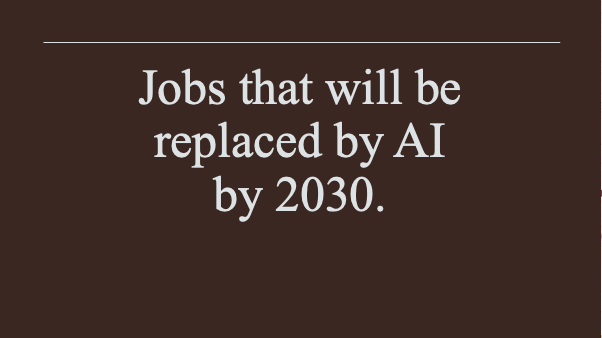Jobs that will be replaced by AI by 2030. The Great Career Shift of 2030: The Case of USA.
As the whirlwind of technological change continues to rip through the US economy, which is the largest economy in the world, recent studies indicate that approximately 12 million American workers may lose their job by 2030. The future of work is already being shaped by a seismic shift influenced by AI advancements, an ageing population, and the rapid rise of e-commerce. This wave of career transition, often referred to as the "Great Career Shift," has the potential to reshape the landscape of American employment over the next decade.
Understanding the Great Career Shift
A recent McKinsey Global Institute study uncovered the details of the "Great Career Shift," highlighting the role of several key factors. Artificial intelligence (AI) and the revolution in how we shop are two of the most significant game changers.
Let’s use the name John as an example….
Consider John, a dedicated sales assistant at a mid-sized Chicago retail store. For over a decade, John has provided personalised service and face-to-face interactions with customers. However, as e-commerce and automation gain traction, the demand for in-person retail salespeople like John is expected to decline significantly. According to the McKinsey study, the world's Johns may see their roles shrink by more than 600,000 by 2030.
The AI-driven transformation does not stop at retail. It is expected that office support staff, customer service representatives, food service employees, and production workers will be severely impacted. In this regard, generative AI technologies such as ChatGPT play an important role, with the potential to automate up to 30% of hours worked in the United States by 2030.
Let’s see the case of Sarah as an example.
Consider Sarah, a customer service representative for a large telecommunications firm. Her job entails answering customer questions, which are frequently repetitive, and assisting them in resolving problems. However, as chatbot technology advances, her job may be jeopardised. AI is proving to be capable of efficiently managing repetitive tasks, data collection, and basic data processing, all of which are important aspects of Sarah's work.
Another important factor is e-commerce, which brings with it its own set of changes. Because of the growing popularity of online shopping, there is less demand for brick-and-mortar salespeople and a significant increase in jobs in transportation and warehouse management. For example, James, a truck driver, may see an increase in demand for his services as online shopping grows and necessitates more transportation and delivery services. According to the McKinsey study, the transportation sector could grow by 9% by 2030.
Other major factors include the ageing American population and changes in the manufacturing sector. As the population ages, spending habits shift, increasing demand for healthcare workers, while productivity gains in manufacturing may necessitate fewer but more skilled workers.
Other major factors include the ageing American population and changes in the manufacturing sector. As the population ages, spending habits shift, increasing demand for healthcare workers, while productivity gains in manufacturing may necessitate fewer but more skilled workers.
The Great Career Shift: A Glass Half-Empty or Half-Full?
While the "Great Career Shift" is undeniably disruptive, it does not have to spell disaster. Michael Chui, a McKinsey Global Institute partner, offers an intriguing viewpoint. He discusses the "glass-half-empty" and "glass-half-full" perspectives.
The pessimistic viewpoint is centred on lower-wage workers, who are expected to be 14 times more likely to need to change careers. However, the optimistic viewpoint sees re-skilling and transition initiatives as a golden opportunity for these vulnerable workers to transition into higher-paying roles.
Taking Action for a Successful Shift
The question then becomes, will the United States be able to successfully navigate this transition? The answer is dependent on the country's willingness to retrain vulnerable workers. Companies, educational institutions, and the government must all contribute significantly to the "Great Career Shift." The emphasis must be on creating a "skills-based labour market," in which a worker's specific skills are valued as much as if not more than, their academic credentials.
Chui recalls the transition from agriculture to factories when reflecting on the evolution of the American labour market. Despite the drastic changes, the country did not experience high unemployment. While this transition presents new challenges, it also presents new opportunities.
Finally, the "Great Career Shift" is approaching. AI and the revolution in purchasing habits are propelling us toward a future in which millions of people will need to transition to new jobs and, potentially, new industries. However, with the right approach and re-skilling investment, this shift could lead to a brighter, more prosperous future for American workers. "If you're an optimistic American," Chui says, "you can do this."


